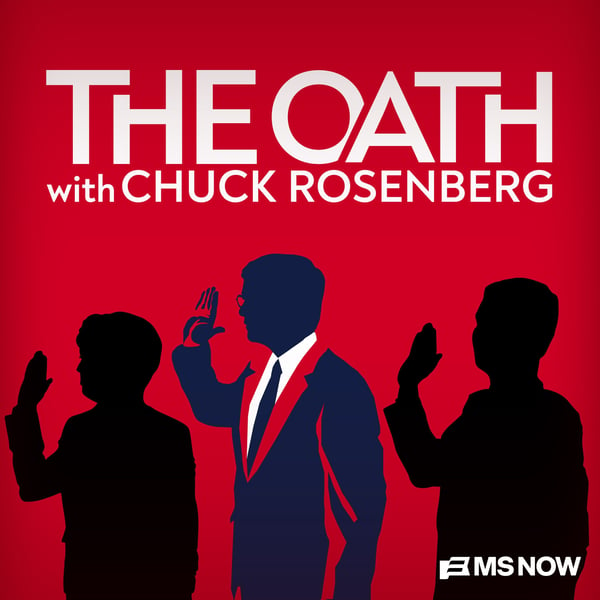James Baker: Going Dark
The Oath with Chuck Rosenberg
MS NOW, Chuck Rosenberg
4.8 • 15.8K Ratings
🗓️ 22 May 2019
⏱️ 56 minutes
🧾️ Download transcript
Summary
Transcript
Click on a timestamp to play from that location
| 0:00.0 | I do solemnly swear that I will support and defend the Constitution of the United States against all enemies, foreign and domestic. |
| 0:11.0 | But I will bear true faith and allegiance to the sea that I take this obligation freely without any mental reservation or purpose of evasion and that I will well and faithfully discharge the duties of the office on which I am about to enter. |
| 0:24.0 | So help me God, it's a help me God. |
| 0:27.0 | Welcome to the oath, I'm Chuck Rosenberg. I am honored to be your host for a series of compelling conversations with fascinating people from the world of public service. All of my guests share one thing. They took an oath mandated by Congress to support and defend the Constitution of the United States against all enemies both foreign and domestic. |
| 0:53.0 | My guest today is Jim Baker. Jim has had a fascinating career in public service. At one point he ran the section at the Department of Justice responsible for all FISA court litigation. |
| 1:05.0 | You've heard about FISA in the news a lot lately, the Foreign Intelligence Surveillance Act, and Jim was the guy responsible for taking those warrants to federal judges for their authorization. |
| 1:17.0 | Later in his career, Jim was the general counsel of the FBI and oversaw that FISA process from another perspective literally across the street from the Department of Justice at the FBI. |
| 1:29.0 | Jim is now the Director of National and Cybersecurity at the R Street Institute, a nonpartisan policy research organization where he writes and talks about these important issues. |
| 1:40.0 | On the oath today, Jim and I are going to discuss the encryption problem, sometimes referred to as going dark. Jim knows those issues as well as anybody in the country. |
| 1:52.0 | Jim Baker, welcome to the oath. Thanks, Chuck, great to be here. |
| 1:56.0 | Oh, I'm really glad that you joined us. I've been looking forward to this. You've had a remarkable career in the Department of Justice and have held some of the most important jobs at DOJ and at the FBI, and we'll get to that. |
| 2:07.0 | But I want to know where it all started. Where did it all start, Jim? |
| 2:11.0 | My career at the Justice Department started in Detroit, Michigan, where I'm from originally. And I started with DOJ after I clerked for a US District Court judge. |
| 2:22.0 | A federal judge. |
| 2:23.0 | A federal judge in Detroit, Bernard Friedman. It was a great and wonderful person, a great mentor, helps me think about my career in the law and where I wanted to go. |
| 2:33.0 | And so it was through my experiences at the court that I found the Justice Department, I guess you would say. |
| 2:38.0 | Probably the most important advice I think for young lawyers, young anything is to find a good mentor. |
| 2:43.0 | Absolutely, absolutely. And he was that to you. He was that to me, for sure. |
| 2:47.0 | So after your clerkship, you ended up at the Justice Department and this thing called the Honors Program. What's the Honors Program? |
| 2:55.0 | It's one of the ways. It's the main way that the Department of Justice will hire new attorneys out of either law school or a clerkship. |
| 3:02.0 | That's pretty much the only way to get in. |
| 3:05.0 | Yeah, and I had always thought it was a difficult program to enter, except that that's how I got in. |
... |
Please login to see the full transcript.
Disclaimer: The podcast and artwork embedded on this page are from MS NOW, Chuck Rosenberg, and are the property of its owner and not affiliated with or endorsed by Tapesearch.
Generated transcripts are the property of MS NOW, Chuck Rosenberg and are distributed freely under the Fair Use doctrine. Transcripts generated by Tapesearch are not guaranteed to be accurate.
Copyright © Tapesearch 2025.

